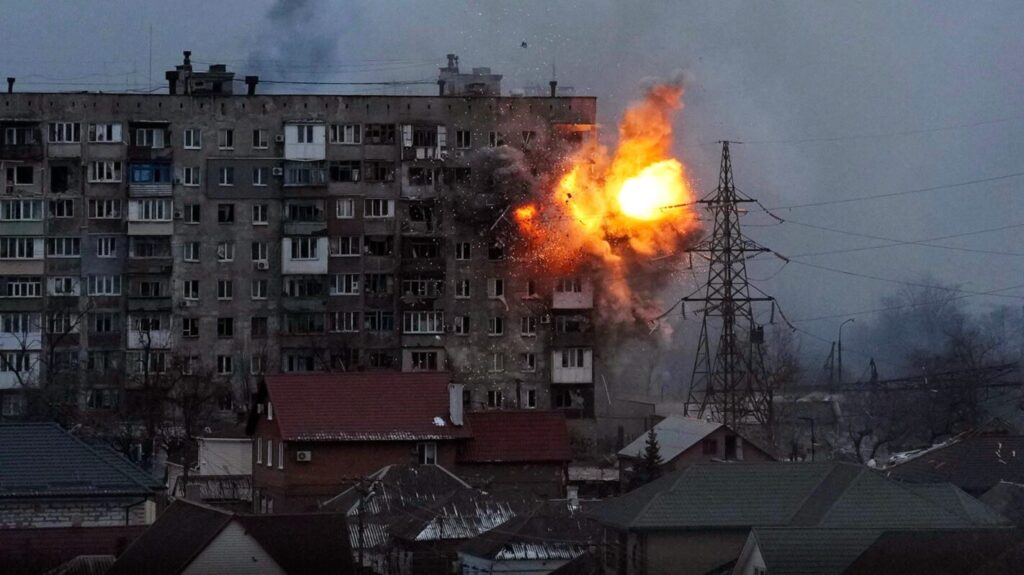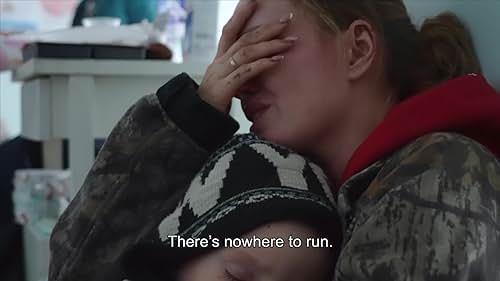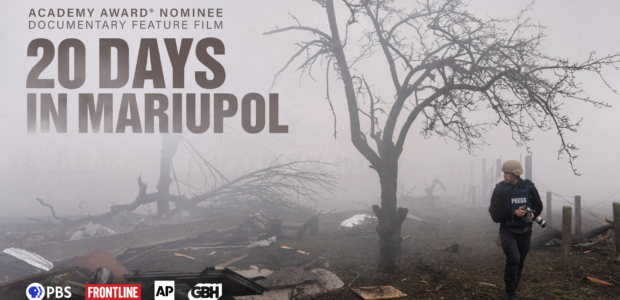A certain thickness of skin comes with the territory for people who exist immersed in the genres of horror and true crime. Particularly in extremist horror circles, tolerance to the utmost depravity is compared like war wounds and for those of us that voyaged the wild west of the early internet, our desensitization even leaks out into the shock videos and gore that were passed around like benign pranks at a party: “Yeah yeah, Funkytown, we’ve all seen it.”
As such, why would another war documentary at another film festival carry any sort of apprehension or dread? It can’t be much different; it can’t be any worse than watching History Channel for twelve hours on D-Day or the latest banned in x amount of countries gore fest. But then it is, and it was, and then I didn’t write half a year at all because of the crushing shame and existential dread that bored its way into my brain over the 94 minutes of 20 DAYS IN MARIUPOL.

Directed by Mstyslav Chernov, the documentary tells the story of the twenty days Chernov spent with his colleagues in Mariupol after Russia began its invasion of Ukraine in 2022. Chernov compiled footage that he collected in Mariupol together with the team from Frontline and the Associated Press (AP) into one of the most difficult to watch chronicles of war, illegal occupation, and anxiety that to exist on modern film. It premiered on January 20 at the 2023 Sundance Film Festival where, deservedly, it won the Sundance World Cinema Documentary Competition.
It was my every intention to review this documentary. I was, and am, constantly following updates on the situation in Ukraine through both news sources and my own personal friends and acquaintances in and around the area itself and was full of a fiery passion to tell everyone in the world to go see it the instant it had a limited showing in their city. But then I sat down, the lights went out, and the sights and the noise enveloped me in horrific surround sound, and then I cried, and then I went numb, and then I didn’t write anything beyond the one sentence I asked these same acquaintances over and over for the rest of the festival:
How do I write a review where I recommend people go to watch people die?
The dead children, the body pits, the smoke and the blood and the crying and the begging, how do I sit there with my little laminated press badge on my little comfy chair and go through this festival like business as usual and tell people that it’s a titanically important visual record, it is, that absolutely should be seen lest deniers of the endless atrocities committed by the Russian army try to silence everything, they are, when I know they’re going to watch a four-year-old girl with a blurred face covered in a pool of her own blood die in the hands of medics. Among other things.
I still see that girl.
How do you talk about a documentary with quantitative wording with editing and pacing like it’s a relic of the past or an artistic record and not something that is still happening, right now. People who watch this could know some of these people. That little girl could easily be the family of someone who sees this, if they see it, and I’m going to sit here and say “Do it?”
What’s the point in reviewing anything when an eight-hour flight away from me right now there’s the constant drumbeat of occupation, torture, and death? Seriously, what?
So I didn’t anymore. I didn’t write anything, and then the shame of my own stagnation blended with the shame that had me stop in the first place into an ouroboros of suck.
However, as with a lot of things in life, music seemed to provide an answer. Among several encores and a flood of stage banter and conversation, a Ukrainian musician yelled at the crowd to film his speech about the war, to witness, document, to share it and talk. To keep going and force people to look at what was happening, even if it was just a clip of him being uploaded somewhere on Instagram where three people see it. Maybe that does something. Maybe one of those three people gives a shit enough to do something tangible. Maybe that’s enough, maybe it has to be.
Maybe that’s why you absolutely should see 20 DAYS IN MARIUPOL the instant it has a showing in your city. Sit there. Witness. Let it break you and push you into whatever action you need to be pushed into, even if it’s just a discussion. Even if you see things you can’t unsee, and you will, maybe we need these things burned into the film of our memory, the reality of somewhere intangible to a lot of people made manifest in violent technicolor.
Because they are there, they exist, and they are dying, those 20 days and all the days after. And we need to give a shit.

Tags: Documentaries


No Comments